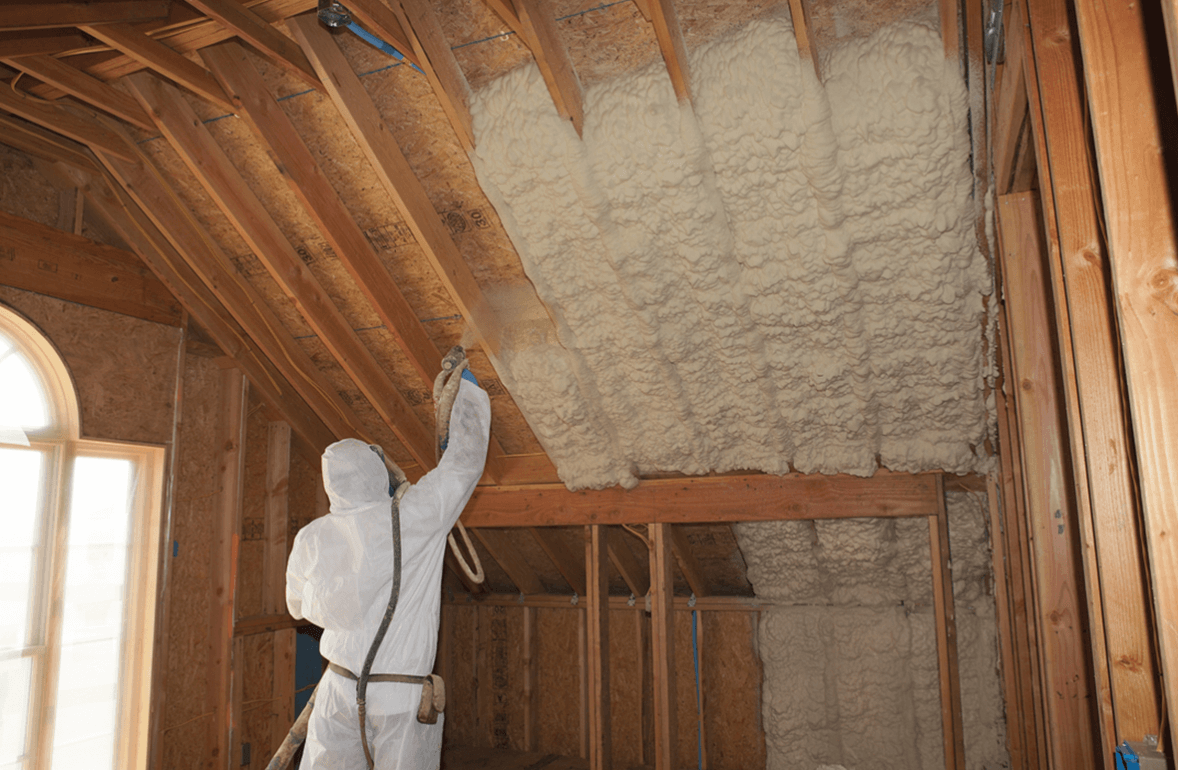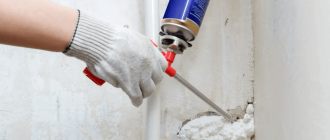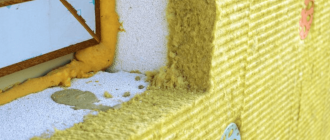Spray foam insulation is a revolutionary solution for roof insulation. It offers numerous advantages that make it the preferred choice for homeowners and businesses alike.
First and foremost, spray foam insulation provides superior thermal performance. It creates an airtight seal that prevents air leakage and minimizes heat loss or gain. This not only enhances the comfort of your indoor space but also helps reduce energy consumption and lower utility bills.
Additionally, spray foam insulation offers exceptional moisture resistance. It forms a seamless barrier that prevents water penetration, therefore reducing the risk of mold and mildew growth. This not only protects the structural integrity of your roof but also improves the indoor air quality of your property.
Moreover, spray foam insulation acts as a noise barrier. Its dense and compact nature absorbs and reduces sound transmission, making your living or working environment quieter and more peaceful. This is especially beneficial if you live in a noisy neighborhood or work in a bustling commercial area.
Last but not least, spray foam insulation is a durable and long-lasting solution. It adheres tightly to various roof surfaces, forming a protective layer that can withstand extreme temperatures, harsh weather conditions, and everyday wear and tear. This means you can enjoy the benefits of spray foam insulation for many years to come without worrying about frequent replacements or repairs.
In conclusion, choosing spray foam insulation for your roof is a wise investment that offers unparalleled advantages in terms of thermal performance, moisture resistance, noise reduction, and durability. Don’t miss out on the opportunity to improve your property’s energy efficiency, protect your roof, enhance indoor comfort, and enjoy a quieter living or working environment.
Benefits of Spray Foam Roof Insulation
Spray foam roof insulation offers numerous benefits for both residential and commercial buildings. Here are the key advantages of using foam insulation for your roof:
1. Superior Insulation
Spray foam insulation provides exceptional thermal insulation, creating a continuous barrier that minimizes heat transfer. This helps to keep your home or building cool in the summer and warm in the winter, reducing the need for excessive heating or cooling.
2. Energy Efficiency
By reducing heat transfer, spray foam insulation can significantly improve energy efficiency. This can lead to lower energy bills and a reduced carbon footprint, making it an environmentally-friendly choice.
3. Seamless Coverage
Unlike traditional insulation materials, spray foam expands and seals gaps, cracks, and seams, providing a seamless coverage. This effectively prevents air infiltration and moisture intrusion, which can lead to mold growth and structural damage to the roof.
4. Durability
Spray foam roof insulation is known for its long-lasting durability. It can withstand harsh weather conditions, including strong winds, rain, and UV radiation, without deteriorating or losing its insulation properties. This can extend the lifespan of your roof and reduce maintenance costs.
5. Noise Reduction
The dense and flexible nature of spray foam insulation can also help to reduce noise transmission from outside. This can create a quieter living or working environment, promoting comfort and productivity.
Overall, spray foam roof insulation offers a wide range of benefits, including superior insulation, energy efficiency, seamless coverage, durability, and noise reduction. Consider using spray foam insulation for your roof to enhance the comfort, energy efficiency, and longevity of your building.
Energy Efficiency
Spray foam roof insulation offers numerous advantages when it comes to energy efficiency. The unique composition of spray foam creates a seamless and airtight barrier, preventing any air leaks or thermal bridging that can occur with other types of roof insulation.
By effectively sealing your roof, spray foam insulation keeps your home or building at a consistent temperature, reducing the workload on heating and cooling systems. This translates into significant energy savings and can help lower your monthly utility bills.
Reduced Heat Transfer
The spray foam’s high R-value and excellent thermal resistance contribute to reducing heat transfer between your home and the outside environment. This means that during hot summer months, you can enjoy a cooler interior space as the spray foam insulation acts as a barrier against heat penetration.
Elimination of Drafts
One of the biggest advantages of spray foam roof insulation is the elimination of drafts. Unlike traditional insulation materials, spray foam expands and fills all gaps and crevices, creating a complete and continuous insulation layer. This ensures that there are no cold spots or drafts, providing a comfortable and energy-efficient living or working environment.
Overall, with its excellent thermal performance and air sealing capabilities, spray foam roof insulation is a reliable choice for enhancing energy efficiency in any building. By reducing heat transfer and eliminating drafts, it helps to create a more comfortable and cost-effective space to live or work in.
Reduced Heating Costs
One of the major advantages of spray foam roof insulation is its ability to significantly reduce heating costs. The foam insulation forms an airtight barrier that prevents air leakage, which can be a major source of energy loss in traditional insulation materials.
By sealing cracks, gaps, and joints in the roof, spray foam insulation prevents warm air from escaping the building during the colder months. This helps to maintain a consistent and comfortable indoor temperature, reducing the need for excessive heating and lowering energy consumption.
Additionally, the foam insulation acts as a thermal barrier, effectively reducing the transfer of heat between the interior and exterior of the building. This means that less heat is lost through the roof during winter, and less heat is gained from the sun during summer. As a result, the building remains cooler in the summer and warmer in the winter, further decreasing the reliance on heating and cooling systems.
Benefits of reduced heating costs:
- Lower energy bills
- Increased energy efficiency
- Reduced carbon footprint
- Improved indoor comfort
- Long-term cost savings
By investing in spray foam roof insulation, you can enjoy these long-term benefits while also contributing to a more sustainable and eco-friendly future.
Enhanced Durability
One of the major advantages of spray foam roof insulation is its enhanced durability. Unlike traditional insulation materials, such as fiberglass or cellulose, spray foam insulation forms a strong and seamless barrier that can withstand the test of time.
The foam insulation is applied as a liquid, which then expands and hardens to create a solid and rigid structure. This results in a roof that is highly resistant to damage and deterioration.
Longevity
With its enhanced durability, spray foam roof insulation can significantly extend the lifespan of your roof. The foam insulation provides a protective layer that prevents moisture infiltration and reduces the likelihood of leaks and water damage.
Furthermore, the strong and seamless nature of spray foam insulation helps to prevent the development of cracks and gaps that can occur with other insulation materials. These cracks and gaps can compromise the integrity of the roof and lead to additional maintenance and repair costs.
Resistance to Environmental Factors
Spray foam insulation is also highly resistant to various environmental factors that can cause damage to traditional insulation materials. It can withstand extreme temperatures, moisture, wind, and even pests.
Unlike traditional insulation materials that can become saturated with water and lose their effectiveness, spray foam insulation is water-resistant. This means that it won’t soak up water like a sponge, ensuring that its insulating properties remain intact.
Additionally, spray foam insulation is not prone to mold or mildew growth, making it an ideal choice for buildings located in humid or moist climates.
| Advantages of Spray Foam Roof Insulation |
|---|
| Enhanced Durability |
Protection Against Leaks
One of the key advantages of spray foam roof insulation is its ability to provide a strong and durable barrier against leaks. The foam material forms a seamless and tight seal on the surface of the roof, preventing any water or moisture from seeping through.
This protective barrier is especially important in areas that experience heavy rainfall or snowfall. With traditional roofing materials, such as tiles or shingles, there is always a risk of gaps or cracks forming over time, which can lead to leaks and water damage. However, with spray foam insulation, these risks are greatly minimized.
Seamless Application
The spray foam is applied directly onto the roof surface, allowing it to conform to all the curves and contours. This ensures that there are no gaps or areas of weakness where water can penetrate. The foam adheres tightly to the roof, creating a watertight barrier that can withstand even the harshest weather conditions.
Long-lasting Protection
Spray foam roof insulation is highly durable and long-lasting. It can withstand the expansion and contraction that occurs with changes in temperature, without cracking or breaking. This means that once the foam is applied, it will provide reliable protection against leaks for many years to come.
By choosing spray foam insulation for your roof, you can have peace of mind knowing that your property is well-protected against leaks and water damage. It is a cost-effective solution that not only enhances the energy efficiency of your building but also extends the lifespan of your roof.
Increased Structural Stability
The insulation properties of spray foam roof insulation contribute to increased structural stability. When applied, the foam adheres and expands, providing a seamless layer of insulation that helps to reinforce the roof’s structure.
This added stability can help to prevent issues such as sagging or shifting due to temperature changes or structural stress. The foam’s ability to conform to irregular surfaces also helps to distribute weight evenly, reducing the risk of localized stress points.
With increased structural stability, the roof is better equipped to withstand extreme weather conditions, such as high winds, heavy snow, or intense heat. This can help to extend the lifespan of the roof and minimize the need for costly repairs or replacements.
In addition, the insulation properties of spray foam can also improve the overall energy efficiency of a building. By reducing heat transfer, the foam helps to maintain a consistent indoor temperature, reducing the workload on heating and cooling systems and potentially lowering energy costs.
Overall, the increased structural stability provided by spray foam roof insulation enhances the durability and energy efficiency of a building, making it a worthwhile investment.
Noise Reduction
One of the added benefits of spray foam roof insulation is noise reduction. The foam acts as a sound barrier, minimizing outside noises such as traffic, construction, or loud neighbors. This can greatly improve the comfort and tranquility of your living or working space.
How does insulation reduce noise?
Spray foam insulation has a high Sound Transmission Class (STC) rating, which measures the ability of a material to block sound. The dense foam effectively absorbs and dampens sound vibrations, preventing them from traveling through the roof and into the interior of the building. Whether you’re trying to create a peaceful home environment or a quiet workspace, spray foam roof insulation can help reduce unwanted noise and distractions.
The advantages of foam roof insulation for noise reduction
There are several advantages of using spray foam insulation for noise reduction:
- Seamless coverage: Spray foam insulation adheres to any surface, providing a seamless and airtight barrier. This prevents sound from seeping through gaps or cracks in the roof.
- Thermal insulation: In addition to reducing noise, spray foam insulation also provides excellent thermal insulation. It helps to maintain a consistent temperature inside your building, keeping you cool in the summer and warm in the winter.
- Durable and long-lasting: Foam roof insulation is highly durable and can last for several decades with proper maintenance. This means you can enjoy the benefits of noise reduction for years to come.
- Energy-efficient: By reducing heat transfer, spray foam insulation can also help lower your energy bills. With a more energy-efficient building, you can enjoy a quieter and more cost-effective living or working environment.
Overall, spray foam roof insulation not only provides the advantages of energy efficiency and structural benefits, but it also offers the added advantage of noise reduction. Whether you live in a noisy neighborhood or want a peaceful atmosphere in your office, foam roof insulation can significantly improve your acoustic experience.
Improved Indoor Air Quality
Spray foam roof insulation offers numerous advantages, one of which is improved indoor air quality. Roof insulation helps to create a barrier between the interior space and the outside environment, preventing air pollutants, allergens, and moisture from entering the building.
The foam used in the insulation is made up of tiny, interconnected cells that form an airtight seal. This seal prevents the entry of outdoor pollutants, such as dust, pollen, and other allergens, into the building. As a result, the indoor air quality is significantly improved, providing a healthier and more comfortable environment for occupants.
In addition to improving indoor air quality, spray foam roof insulation also helps to regulate the temperature inside the building. It acts as a thermal barrier, reducing heat loss in the winter and heat gain in the summer. This not only enhances comfort but also helps to reduce energy consumption and lower utility bills.
Furthermore, the foam insulation provides an excellent moisture barrier, preventing water and moisture infiltration. Moisture can lead to the growth of mold and mildew, which not only damages the structure but also negatively impacts indoor air quality. By preventing moisture from entering the building, spray foam roof insulation helps to maintain a dry and healthy environment.
In conclusion, the advantages of spray foam roof insulation extend beyond energy efficiency and cost savings. Improved indoor air quality is another significant benefit, ensuring a healthier and more comfortable living or working space.
Environmentally Friendly
Spray foam roof insulation has many advantages, and one of the most important is its environmentally friendly nature. The foam used in this insulation is made from renewable materials, making it a sustainable choice for roof insulation.
This type of insulation helps to reduce energy consumption by creating a tight seal on the roof, preventing heat loss in the winter and heat gain in the summer. By reducing the need for heating and cooling, spray foam insulation can help lower electricity and fuel consumption, leading to a smaller carbon footprint.
Reduced Waste
Another advantage of spray foam roof insulation is that it generates less waste compared to other types of insulation. Traditional insulation materials, such as fiberglass, often produce excess waste during installation. In contrast, spray foam insulation is applied directly to the roof and expands to fill any gaps, minimizing waste.
This reduced waste not only benefits the environment but also reduces the cost of disposal. With spray foam insulation, there is less material that needs to be removed and disposed of, further contributing to its eco-friendly nature.
Improved Air Quality
Spray foam roof insulation also helps improve indoor air quality. The air barrier created by the foam helps to prevent the infiltration of outdoor pollutants, such as dust, pollen, and airborne contaminants.
Additionally, spray foam insulation does not emit harmful chemicals or VOCs (volatile organic compounds) that can negatively impact air quality. This is especially important for individuals with respiratory conditions or allergies.
In conclusion, spray foam roof insulation not only provides excellent thermal insulation but also offers environmental benefits. Its sustainable production, reduced waste, and improved air quality make it a wise choice for those looking to minimize their impact on the environment and create a healthier indoor environment.
Longevity
Spray foam roof insulation offers exceptional longevity and can significantly extend the lifespan of your roof.
One of the key advantages of using spray foam insulation on your roof is its ability to provide a protective barrier against moisture and water leaks. The foam is seamless, ensuring that there are no joints or seams for water to penetrate. This helps in preventing the deterioration of your roof and reduces the chances of leaks, which can lead to structural damage and costly repairs.
Spray foam insulation is highly resistant to mold and mildew, which are common problems in roofs. Mold and mildew can cause a range of health issues and can also weaken the structure of your roof. By eliminating the conditions that promote mold growth, spray foam insulation helps in maintaining the integrity of your roof for a longer period of time.
Another advantage of spray foam insulation is its durability. The foam is highly resistant to cracks, peeling, and other types of damage that can be caused by extreme weather conditions, such as strong winds and hail. This ensures that your roof remains intact and well-protected, even in the face of harsh environmental factors.
In addition to its durability, spray foam insulation also helps to improve the energy efficiency of your home. By creating an airtight seal, the foam prevents air leaks and heat transfer, reducing your heating and cooling costs. This not only saves you money in the long run but also reduces your carbon footprint, contributing to a more sustainable and eco-friendly lifestyle.
Summary:
- Spray foam roof insulation offers exceptional longevity and can significantly extend the lifespan of your roof.
- Its seamless nature prevents water penetration and reduces the risk of leaks and structural damage.
- It is highly resistant to mold and mildew, helping to maintain the integrity of your roof.
- Spray foam insulation is durable and can withstand extreme weather conditions.
- It improves energy efficiency and reduces heating and cooling costs.
Easy Installation
The easy installation process of spray foam roof insulation is one of its major advantages. Unlike other insulating materials that can be time-consuming and labor-intensive to install, spray foam insulation can be quickly and efficiently applied to the roof surface.
Using a specialized spraying equipment, the foam is evenly distributed across the entire roof, creating a seamless barrier against heat transfer and moisture infiltration.
Time-Saving
Compared to traditional insulation methods, spray foam insulation saves time during installation. Its quick application allows for faster project completion, reducing labor costs and minimizing disruptions to daily activities.
No Additional Structural Support
Another advantage of spray foam roof insulation is that it adds minimal weight to the structure. Unlike other insulation materials that may require additional support due to their weight, spray foam is lightweight and does not put excessive stress on the roof.
Versatility
Spray foam roof insulation offers a high level of versatility, making it an ideal choice for a wide range of roofing applications. Whether you have a flat roof or a sloping roof, spray foam can be applied seamlessly to create a durable and energy-efficient barrier.
One of the advantages of spray foam is its ability to conform to any shape or size of roof. This means that it can be applied to roofs with irregular shapes or contours without any difficulty. Whether your roof has vents, pipes, or other obstacles, spray foam can be easily sprayed in and around them to provide a complete and effective insulation solution.
In addition to its flexibility, spray foam also offers versatility in terms of its application process. It can be applied to both new and existing roofs, making it suitable for retrofit projects as well as new construction. Whether you are insulating a residential property or a commercial building, spray foam can be adapted to meet your specific needs.
Furthermore, the versatility of spray foam extends to its ability to provide additional benefits beyond insulation. Spray foam can also act as a moisture barrier, protecting your roof from water damage and preventing the growth of mold and mildew. This can help to improve the overall lifespan of your roof and ensure its long-term performance.
- Adaptable to any shape or size of roof
- Suitable for new construction and retrofit projects
- Acts as a moisture barrier
Overall, the versatility of spray foam roof insulation makes it a highly advantageous option for any roofing project. Its ability to conform to any roof shape, its flexible application process, and its additional benefits make it a reliable choice for creating a durable and energy-efficient roof. Consider spray foam roof insulation for your next roofing project and enjoy the numerous advantages it has to offer.
Return on Investment
Choosing spray foam roof insulation can provide significant returns on your investment.
Firstly, spray foam insulation helps to reduce energy costs by improving the thermal efficiency of your roof. By sealing gaps and cracks, it minimizes air leakage, preventing hot or cold air from escaping your building. As a result, you will see a reduction in heating and cooling expenses throughout the year.
Additionally, spray foam roof insulation offers long-lasting performance. Once applied, it forms a durable and seamless barrier that can last for decades. This means you won’t have to worry about frequent replacements or repairs, saving you money in the long run.
Moreover, the advantages of spray foam insulation extend beyond just the financial aspect. By creating an airtight seal, it prevents moisture infiltration and helps to protect your roof from potential water damage. This can prevent the need for expensive repairs or roof replacements due to leaks or mold growth.
Furthermore, spray foam insulation is an eco-friendly choice. By reducing energy consumption and greenhouse gas emissions, it contributes to a more sustainable and environmentally-friendly building. This can enhance your company’s reputation and attract eco-conscious customers or tenants.
In conclusion, investing in spray foam roof insulation offers numerous advantages, including energy cost savings, long-lasting performance, protection against water damage, and environmental benefits. By choosing this insulation option, you can enjoy a significant return on your investment both in terms of financial savings and sustainability.
Q&A:
What are the advantages of spray foam roof insulation?
There are several advantages of spray foam roof insulation. Firstly, it provides excellent thermal insulation, helping to keep your home cool in summer and warm in winter. Secondly, it acts as a barrier to air infiltration, preventing drafts and increasing energy efficiency. Thirdly, it can improve the structural integrity of your roof by adding strength and durability. Lastly, spray foam insulation can help to reduce noise transmission from outside, creating a quieter and more peaceful living environment.
How does spray foam roof insulation provide thermal insulation?
Spray foam roof insulation provides thermal insulation by creating an airtight seal that prevents heat transfer through your roof. The foam insulation has a high R-value, which measures its ability to resist heat flow. This means that it effectively reduces the amount of heat that can enter or escape your home through the roof, resulting in improved energy efficiency and lower heating and cooling costs.
Can spray foam roof insulation help to prevent roof leaks?
Yes, spray foam roof insulation can help to prevent roof leaks. When applied properly, the foam insulation forms a seamless and watertight barrier that seals your roof, preventing water from entering through cracks or gaps. This can help to protect your home from water damage and extend the lifespan of your roof. Additionally, the foam insulation can also provide added protection against wind-driven rain and moisture infiltration.
How long does spray foam roof insulation last?
Spray foam roof insulation is a durable and long-lasting option. When installed correctly and maintained properly, it can last for several decades without the need for replacement. The lifespan of spray foam insulation can vary depending on factors such as climate, exposure to sunlight, and maintenance practices. However, with regular inspections and maintenance, you can ensure that your spray foam roof insulation continues to perform effectively for many years.
Is spray foam roof insulation safe for the environment?
Yes, spray foam roof insulation is considered to be safe for the environment. The foam insulation is made from polyurethane, which is an inert and stable material that does not release harmful chemicals into the air or contribute to ozone depletion. Additionally, spray foam insulation helps to reduce energy consumption by improving the energy efficiency of your home, leading to a lower carbon footprint. It is important to hire a professional contractor who follows proper installation practices to ensure the safe and effective use of spray foam roof insulation.
What are the advantages of spray foam roof insulation?
Spray foam roof insulation has several advantages. It provides excellent insulation and helps reduce heating and cooling costs. It creates a seamless and airtight barrier that prevents air leakage and reduces drafts. Additionally, it helps to reinforce the structural integrity of the roof and provides protection against moisture and water damage.
Does spray foam roof insulation help in reducing noise?
Yes, spray foam roof insulation can help in reducing noise. The foam has soundproofing properties that can absorb and reduce sound vibrations. This can be particularly beneficial in areas with high levels of noise pollution, such as near airports or busy roads.







